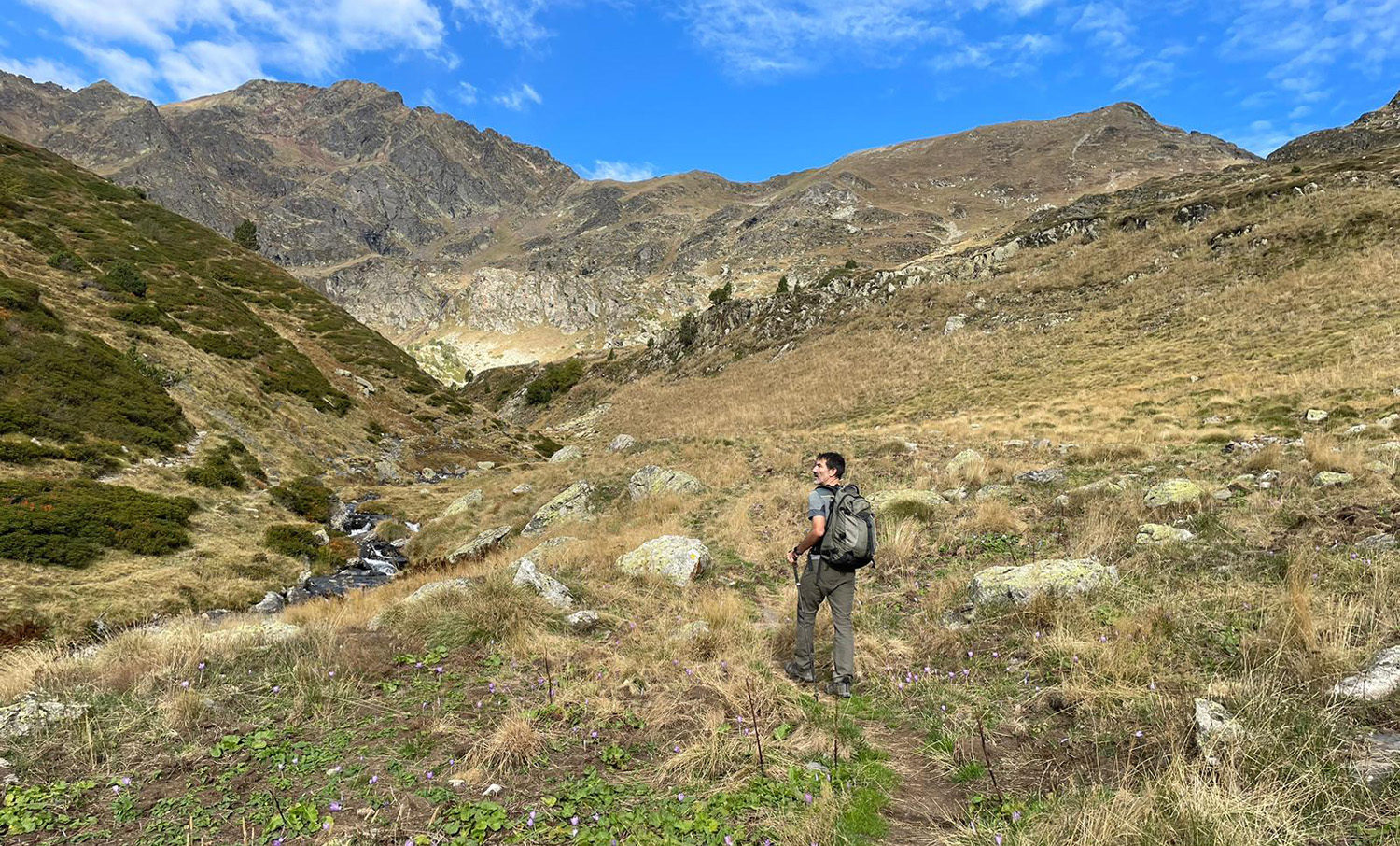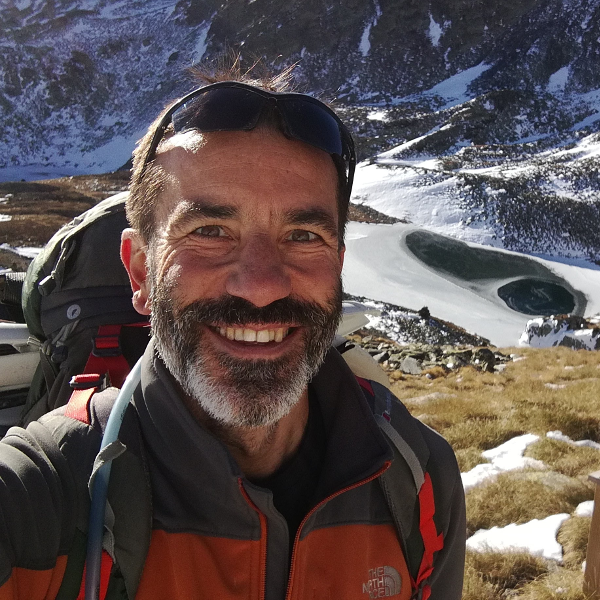Bernat Claramunt and the mountain as a stage
Spending childhood holidays in the Pyrenees camping with the family must undoubtedly leave a mark on adult life. At the very least, it conditions the way we relate to nature and understand leisure. And this is the happy experience that CREAF researcher Bernat Claramunt has of his summers. As a result, the mountains become part of his imagination of what it means to explore and discover, not only landscapes but also marmots, forests, birds of prey and streams, to name a few. His fascination with Biology was definitively revealed in Secondary School thanks to the biologist Marina Mir, a pioneer in Catalonia in incorporating didactics into the first nature itineraries. "However, I liked many things," he admits, "in fact, as an alternative to Biology I chose to study Physical Education or Translation and Interpretation.”
The fascination with bird watching is precisely the origin of his knowledge of German: “I began to focus on birds, I lived to follow them and I heard that in Germany there were higher Biology courses specializing in ornithology. And without thinking twice, I started to study German,” he recalls.
"If we are interested in the survival of a natural community in a broad sense, we must take into account all the elements that interact with each other: actors and governance"
The mountain is a setting that is opening up to his scientific journey, first through the study of the marmot, then broadening his field of vision and encompassing it as a whole. And this is not a cliché: today Bernat Claramunt's most relevant line of research is “the development of mountain societies”, with an emphasis on the plural, as well as aspects such as the characteristic of mountains as water towers, the rise of the forest line, changes in plant and animal biodiversity, new uses of meadows and pastures and the retreat of glaciers. “If we are interested in the survival of a natural community in a broad sense, we must take into account all the elements that interact with each other: actors and governance”, he explains. "For me it is natural to think of the social-ecological system as a network of complex interactions, like food chain”.

An ecologist sensitive to socioeconomics
The question is tempting: what does a biologist do by delving into socioeconomic aspects? His explanation is exhaustive and argues the evidence: “it is a natural evolution; to preserve the natural mountain system it is key to open our eyes to the environment. I am interested in the conservation of this natural system in a context of global change and that is why I must measure the relationships between the different elements: both natural, such as the biodiversity of birds, and the number of second homes, for example”. The mountain scenario today contemplates a context where “hunting, agriculture, tourism and laws” have a place, in the words of the researcher.
The natural community becomes a kind of axis that links activities, needs and resources. “I am increasingly interested in the social and economic context in which the natural community is located. I am a specialist in the environmental part and I want to know the social and economic aspect in the context of the development of mountain societies, taking into account the European Green Deal and the nature conservation directives”. The geography where Claramunt's research is located is mainly Europe, where many valleys experience human influence.
His interest in the social and economic context of mountain economies has led him to promote the XIII European Mountain Convention of the Euromontana network from CREAF, which the center co-organizes together with the European Euromontana network and the Generalitat de Catalunya. It is held in Puigcerdà (La Cerdanya) from 15 to 18 October 2024 and its program and approach include representatives of agriculture, livestock, grazing activity, companies, NGOs, civil society and political management from several countries. In a conversation days before the congress, he explained what he would like the outcome of the congress to be: "I would like the recommendations resulting from the discussions to be useful and to be able to be implemented in public policies".

“I am interested in the conservation of the natural mountain system in a context of global change and therefore I must measure the relationships between the different elements: natural, such as the biodiversity of birds, or the number of second homes”.
BERNAT CLARAMUNT, CREAF researcher.
A fragile natural environment
Claramunt's scientific aim is to ensure that mountain areas do not lose population, that they have a recognised quality of life, and that the harmony of a very fragile natural environment can be maintained
Its scientific aim – if one can choose just one – is to ensure that mountain areas do not lose population, that they have a recognised quality of life, and that the harmony of a very fragile natural environment can be maintained. Bernat Claramunt warns of the risk of overcrowding that valleys may suffer and holds up a mirror to some coastal towns, while acknowledges the lack of some essential services in some mountain areas. And when asked what mountain economies need to prosper as a socio-ecological environment, the answer is as clear as a whistle: “good ideas!”
He admits that a paradigm shift is necessary, because the services that we as a society consider essential for living well continue to have a lot of weight. Although there are a few minimums that mountain economies cannot always guarantee, such as hospitals and schools. “In Scandinavia, for example, this does not happen and it is better to live outside the city of Oslo than in its urban centre”, he says. The challenge is great and involves maintaining identity without overcrowding, seeking a balance. “It is a very difficult balance,” he admits, “because there are many ways of understanding what well-being means.”
Almost going back to the beginning of his career, he remembers that he entered the mountains from research thanks to having previously worked with marmots, which made it easier for him to apply for the 'Wildlife in the Changing Andorran Pyrenees' project, funded by Earth Watch. “It has marked a very important stage in my scientific career, and it was the first citizen science proposal in which CREAF was involved.”







